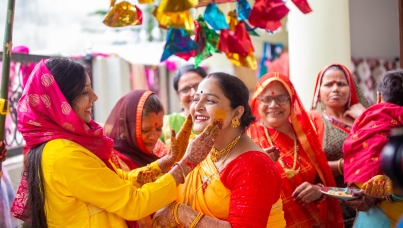

84% Urban Indians say they are happy; India ranks 4th in happiness among 32 countries: Ipsos Global Happiness Survey (Life Satisfaction across the world)
Ipsos Global Happiness Survey that captures Life Satisfaction Across the World shows majority of global citizens polled are happy (73%) and India was placed 4th in the pecking order, with 84% of the citizens polled claiming to be happy. The top 3 happiest markets emerging were China (91%), Saudi Arabia (86%) and Netherlands (85%).
Happiness by countries
Commenting on the findings of the survey, Amit Adarkar, CEO, Ipsos India said, “Today (March 20th) is the International Day of Happiness. India is among the top happiest markets with at least 8 in 10 urban Indians claiming to be happy. Happiness is a holistic sentiment and not dependent on one happy external event. It runs much deeper, is what the survey is telling us about citizens who are the happiest. India was able to surmount the pandemic with mass vaccination considering we are highly populous; fuel crisis, we were able to negotiate with Russia and the global community, easing the pressure on the citizens. All this is also manifesting into happiness. Because when times were gloomy during the pandemic, happiness levels had dropped to 66% in 2020. We saw a major recovery in 2021. And now in 2023, we once again see further improvement in happiness levels. Happiness infusing list is much longer than one would anticipate.”
The chart above shows shifts in happiness levels by markets.
Multitude of factors provide Life Satisfaction & drive happiness - relationships, education, spirituality, being loved and appreciated, social status
Indians credit a plethora of factors for adding satisfaction to life and in turn making them happy. These factors interestingly contribute together as they have all received high scores. The top ranked areas were: my children (86%), relationship with relatives (85%), exercise and physical activity (85%), relationship with partner or spouse (84%), access to, in touch with nature (84%), level of education, religious faith/ spiritual life (84%), feeling appreciated (84%), looks (83%) access to entertainment/ leisure activities (83%), access to news/ information (82%), co-workers (82%), feeling loved (82%), feeling in control of my life (81%), mental health & wellbeing (81), material possessions (81%), social status (80%). Notably, China and India are similar as opposed to other global markets, where happiness also hinges on how the country is doing. Satisfaction is life also depends upon country’s economic situation (China 78%, India 78%), and country’s social and political situation (China 83%; India (72%).
“Indians are happy because of a multitude of collective attributes that bring harmony in relationship, social status, acknowledgement and wellbeing. Personal relationships shared with family and friends, keeping abreast of news and information, sound education, appreciation and love, access to entertainment, being close to nature, spirituality, and vanity (looks), employment, material possessions and even the economic and social health of the country,” added Adarkar.
For global citizens the biggest contributors in adding satisfaction to life, according to them were: My children (if a parent) (85%), relationship with partner/spouse (if has one) (84%), access to/ in touch with nature (80%), level of education (80%) relationship with relatives (78%), friends (78%), access to news/ information (77%), co-workers (if employed) (77%), feeling loved (76%), feeling free to do and say what I want (76%), personal safety and security (75%) access to entertainment/leisure activities (75%l job (if employed) (74%), religious faith or spiritual life (74%) living conditions (74%), amount of free time (74%), Looks (73%), feeling in control of my life (73%), feeling my life has meaning (73%), feeling appreciated (73%).
Challenging experiences can impact happiness
72% of global citizens and 68% of urban Indians said they have one or several close friends they rely on to help them in case of need. 1 in 2 urban Indians (50%) and 39% of global citizens polled also said that they recently experienced a deeply disturbing and distressing event that has prevented them from feeling good about their life. 47% Indians and 37% global citizens also said they recently faced or were facing a difficult personal situation that they could not have resolved by themselves.
Consumer confidence as a measure of happiness
Another key finding from this study is that, at the country-level, levels of happiness tend to reflect levels of consumer sentiment. Ipsos compared the percentage of happy adults and Ipsos’s Consumer Confidence Index across the 22 countries where both were measured in the same survey and found they are highly correlated. The Consumer Confidence Index tracks people’s sentiment about their financial situation, their ability to make purchases and investments, and perceptions of their local economy, job security and future opportunities.



